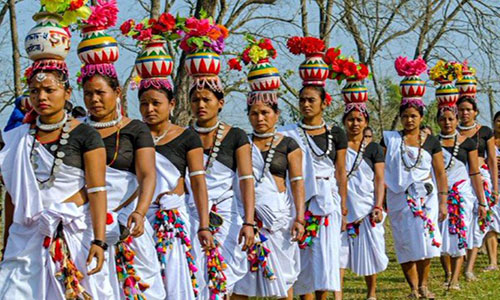Context:
The Tharu community is currently celebrating their major festival, Maghi Parva, from January 14 to January 20, 2025. This celebration is taking place at the Tharu Cultural Museum, located in Sundarharaicha Municipality, Morang district, in eastern Nepal.
· This weeklong festival brings together Tharu culture, traditions, cuisine, and arts on a vibrant national and international stage.
· Featuring over 40 industrial stalls and 30 food stalls, the event highlights the unique crafts, foods, and cultural practices of the Tharu community, attracting both domestic and international attention.
Importance of the Festival
Maghi is a major festival for the Tharu people, marking the first day of the Nepali month Magh. It is a time for the community to celebrate and honor their rich traditions, cultural heritage, and deep connection to the land.
For the Tharu, it is a moment of unity, reflection, and cultural pride, as families gather to celebrate with food, music, dances, and various social activities. This festival is particularly significant for preserving and promoting the identity and practices of the Tharu community amidst modern influences.
Maghi also plays a crucial role in economic and cultural exchange, as the festival attracts large numbers of visitors. It offers an opportunity to showcase Tharu handicrafts, traditional dishes, and locally produced goods to a broader audience, fostering appreciation for Tharu culture.
Additionally, the festival encourages the younger generation to engage with and continue the customs and traditions of their ancestors.

About the Tharu People
The Tharu people are an indigenous tribe that primarily resides in the Terai region of Nepal and India, located in the foothills of the Himalayas.
· In Nepal, the Tharu population is estimated at 1.7 million, according to the latest census in 2021. In India, they live mainly in the states of Uttarakhand, Uttar Pradesh, and Bihar.
· The Tharu community is known for its deep-rooted traditions in agriculture, handicrafts, and cultural practices. Their unique lifestyle and customs, such as joint family systems, patrilineal social structures, and distinctive marriage rituals, have made them a culturally rich group that has managed to preserve their identity despite modern challenges.
· Tharu cuisine, clothing, and dance forms are key aspects of their vibrant cultural life, all of which are prominently featured during the Maghi festival.
Historical Recognition and Language
In 1967, the Tharu tribe was officially recognized as a Scheduled Tribe by the Government of India, acknowledging their distinct cultural and social identity.
They speak Tharu or Tharuhati, a language belonging to the Indo-Aryan subgroup within the Indo-Iranian group of the Indo-European language family.






